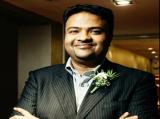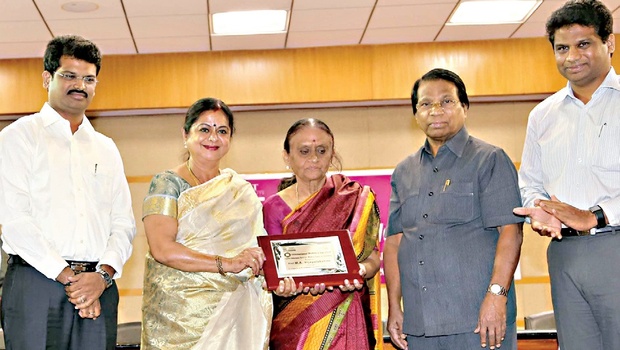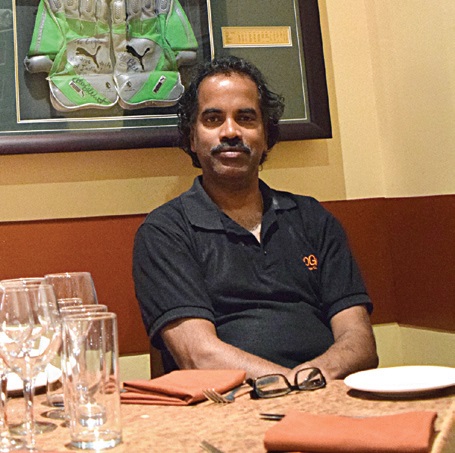
Recently, Wealth-X listed Indian businessman Arun Pudur as the world’s 10th richest individual under 40; top on the list was Mark Zuckerberg of Facebook.
Arun Pudur, whose net worth is estimated at over four billion dollars, is the CEO of Celframe, which makes world’s second most popular word processor after Microsoft, among other things. Based in Kuala Lumpur, Arun Pudur has diversified into several sectors including mining and real estate.
In an exclusive interaction with Tarannum Khan of Deccan Herald, the reclusive billionaire, who says he does not give interviews as they intrude into his personal space, opens up.
He talks about his humble beginnings in Bengaluru, the milestones in his sensational success, the city which made him, his parents and the qualities that propelled him to the top.
A shorter version the interview appeared in the Panorama section of the Deccan Herald.
You were born in Chennai, when did you shift to Bengaluru?
When I was in my sixth standard, my family decided to move to Bengaluru as my father spent nearly seven to eight months in a year there. When we came to Bangalore, we stayed in Rajajinagar and then moved to Basaveshwarnagar before buying a place in HBR Layout. I stayed there till 2003, when I shifted overseas.
When I lived there, there was nothing in HBR Layout. Now I am told it’s a central part of the city.
When you were born, your family felt, you had a great destiny to fulfil…
My father always used to talk about us being Tirupathi Iyengars, one of the three families, who were the high priests at Tirumala. Though we never managed the temple, we always knew greatness was within us.
My mother always used to say that I was the lucky one in the family. After I was born, my father’s career skyrocketed. He passed away just three months ago. My mother always instilled in me that I was born for greatness.
Your parents wielded a considerable influence on your growth…
My father Sri Ranga, was a cinematographer, who was known for his work in the 16 mm movies, which typically tend to be artsy and low-budget movies. He had built quite a reputation in Kannada and Tulu industries and thanks to him I knew everyone in the industry – be it Vishnu uncle, Ambareesh uncle, even Dr Rajkumar and his sons.
I remember when Shivrajkumar stopped his car on a road and touched the feet of my father. I was shocked that my father, who was just a normal guy at home, commanded that kind of respect in the industry.
He did produce a few movies and television serials. But I asked him to retire early as the movie industry is a really tough business and every Friday fortunes are made and lost. I didn’t want him to be stressed out.
My mom was a housewife, who was my teacher as well. She was a disciplinarian, who made sure that we did our chores ourselves, including washing clothes and utensils.
But she was there 24×7 for me and now, I understand, the value she brought to my life. She taught me the way I should grow.
Now I have chefs, cleaners and a dozen people helping me run the house. But my mom used to do everything on her own.
I have a brother as well, who runs his own consulting business.
While stuyding in Bengaluru, you seemed to have stayed away from well-known schools…
When we moved to Bengalurufor my sixth standard, it was already August. So my father had to scramble to find a school.
Though I was supposed to go to National School in Rajajinagar, the cut off date to transfer had passed. So I joined St Anns Matriculation School. I had never been in a co-ed before, so it was a shock when I saw girls sitting in the classroom.
I had to learn Kannada as well. I think in my entire life it was the only time I failed in a subject. I am very proud to say that in a matter of six to seven months, before the end of annual exams, I had mastered Kannada, and scored my usual, between 80 to 95 per cent.
The choice of college was also unconventional…
In SSLC, my results were fantastic, so I could have picked any course or college. Typically for Bangalore, everybody was pushing me to take science. But the entrepreneur bug had already bitten me and I wanted to do commerce instead of science.
While I was looking at St Joseph’s and other colleges, my mother wanted me to come home for lunch everyday as we were not allowed to eat outside.
So, I joined the Nijalingappa College in Rajajinagar, which was nearby. Though everyone said it was notorious, the year I joined, a new principal took over and he turned my college years into the strictest time of my life.
Literally, we were not allowed to do anything at all; only in the last year, that is when I was in the third year of B com, we could have a college day.
I was pretty studious and attendance was very important for me. I would sit right on the front bench everyday. College days are the best memories one has in a life and my longest-lasting friends are from this college.
You have been away from Bengaluru for a long time; what are your memories of the city…
It brings joy whenever I think of my days in Bangalore. The City was extremely cold until early 2000. Coming from Madras in the ’80s, where it was scorching hot, I took to wearing sweaters in Bangalore.
Whenever I travel overseas, and whenever I wear a sweater, the first thing that comes into my mind is Bangalore. If anyone asks me where I am from, my immediate answer is not Malaysia, not Chennai, but it’s Bangalore, India.
I remember the time with my friends when we used to ride in our kinetic Honda and drive down to Bannerghatta or the Tumkur road.
And of course, the one-by-two coffee or tea… Though I was not allowed to have tea or coffee at home, when I was out with my friends, we used to have by-two tea, and I think that’s a very Bengaluruthing to have.
There were some bad experiences as well; when we were staying at Rajajinagar, the Cauvery riots happened. We saw how the National School was looted.
I have not visited Bengalurufor a very long time. My parents went back to Chennai as that was where they were born and brought up. But I am in touch with few of my closest friends through Whats App and Viber.
What turned you into an entrepreneur?
I think curiosity, the zeal to solve problems and take on challenges. If you ask any of my school or college mates, they will tell you that I used to look forward to examinations, which may sound very funny, but that’s true.
I never wanted to work for anybody. In my entire life I have spent just one year working for a company in Jayanager. It was a training company. When I had joined the company they had a turnover of five to six lakhs a year. When I left after nine months, I had brought up the turnover to one crore a year.
I was working to open franchises for this training centre. That guy had promised to pay me for every few centres set up, but he did not keep his word.
I have seen top CEOs of multinational companies, who retired with very little to their name. They were running 120 and 130 billion dollar companies and now may have a personal fortune of 30 to 40 million dollars. And that was what I didn’t want to be.
You began your career at the age of 13 in a garage, fixing kinetic Hondas…
We opened the garage for a guy who was working for a shop near our house; he became a friend of us. He was from Tamil Nadu and could not speak Kannada. As we could speak Tamil, though we are Telugus, he became close to us.
He told me there was good money in garage. So we coaxed our mother and borrowed a few thousands to fund the garage at Rajajinagar, just a stone’s throw away from National school. But he disappeared after five or six months and we were stuck with the garage.
When I began my career in the garage, we had no training. There was no Google at that time or any no manual. I had just had observed how this guy used to fix bikes and picked up from there.
But whenever a bike or a scooter used to come with a problem, I was on my own.
We used to solve problems on the fly and became good at that. I really loved it. I could open and fix back the engine, almost the entire vehicle, in about one hour and fifteen minutes, without any specialised tools.
Sai scooter garage became famous and even scientists from ISRO started coming to us. That is where I think I got the taste of business. That is where I learnt sales, marketing, customer handling, problem solving, managing human resources and financial management.
Running the garage was not a financial necessity to our upper middle class family. But I still ran it till my first year or second year PUC.
I would come back from school, finish homework and then open the garage. On Saturday and Sunday we were open full. It helped me not to get into wrong company, wasting my time, or you can say, chasing girls.
My priority was to show much business I could generate, how much money I could give my mother. My mother, who managed the finances of the house, would keep all the money. We would consider ourselves lucky to even get 10 rupees from her. But I loved the business. That’s why I went into it.
But we decided to close the garage because of my studies; my father wanted me to perform very well in college.
But you started breeding dogs after that…
From my aunt in Chennai, I found out about breeding dogs, and she gave me a Boxer to kick start my business. I started breeding boxers and Rottweilers. I have delivered hundreds of puppies, cut their umbilical cord and taken care of them. Though there was no formal training, I learnt how to manage them. Any dog lover would tell you that a dog will not allow anyone near the puppies unless she trusts you with her life.
Then I used my marketing skills to sell the puppies for up to Rs 20,000, which was good money in the mid ’90s. I was in this business till the end of my final degree.
You started Celframe after graduating; how difficult were the early days…
We opened the first office of Celframe at Lalbagh road. Prior to it, I had done one venture with my brother, which had failed.
Funding is a problem when you are not a big brand or don’t have a big family name behind you. Because of my age, I worked with wrong people, who took advantage of my naivety. I lost quite a bit of money – my own money and also the money of some of my initial backers. But I bounced back and it made me understand people better.
What were the major turning points in your career?
Everything was a turning point – opening the garage, breeding dogs, starting a technology company. But the biggest jump or spike in my revenue happened – if you consider money to be metric of success – when we released our first product called Celframe office.
It is now considered to be the Number 2 office suite in the world by way of sales. Not many people know that Microsoft office makes more than 60 billion dollars annually. When I launched my office suite, companies like Sun had failed in this product category. Even IBM’s Lotus notes had not made a big impact. Coral is still there but its sales are very small.
It is said you were one of the few people the Redmond giant could not smother…
It was more of a David and Goliath kind of situation. Being a monopoly Microsoft used every tool in its arsenal to bring us down. They made sure that no Original Equipment Manufacturer like Dell, HP or IBM would ever buy our products and pre-load them on their PCs.
I will not use the word bully but that is the word everybody uses when it comes to dealing with American tech firms. They use patent, money and media to bring down any small company that may look like a threat.
How did you survive that?
In this industry, partners and distributors get one or two per cent on every deal they make. I decided to give away 40 percent of my revenue and make them partners in success. We treat customers with respect and customise the way they want.
I focused my business more on the public sector as private companies cannot bully the government. We managed to implement our product in several governments in Asian and African regions.
We made it a policy to promise a 50 per cent reduction in the tech cost of customers using our products. That is, if they are paying 100 million dollars to a competitor, we would deploy our software for just 50 million. We would increase the price over three to four years and by this time they would have realised that we were a fantastic company to work with. We also supported them very well.
That was the biggest hurdle I crossed in business. But now with the mobile ending the old monopolies, things are moving forward amazingly.
You have also made you mark as an investor…
I have diversified into gold mining, coal business, oil and gas, real estate, venturing with top companies. I am looking to build a casino and start an airlines in South Africa.
It’s said that my fortune is four billion dollars but with my diversification it has grown nearly five to six times in the last two to three years.
I am a very cautious investor. You want me in, you need to show me why should I invest money. I would like to know the entire story and the people before I do business. I turn away from a deal if the pressure is too much for me to invest money into it.
I invest only if I can get a majority control on that company. I don’t like to be a minority partner as I am very passionate about what I do. I get involved in minute details from the start to the end. The running of the company is done by CEOs whom I trust. But I get involved in major decisions. If a problem needs solving, I am there in the front. I don’t like to sit back and let my people take the hit.
You say your upbringing taught you the value of money
There was a time when I used to buy jets like buying candies. I had eight private jets of my own. I once tried to sell one of my jets and found that I had lost about 40 percent of what I had actually paid. Then I realised that these toys, homes or yachts, do not add much value to you.
I took the hit, got rid of jets and houses, and reinvested them back into my businesses. I also turned whatever jets and yachts I was left with, into a rental business.
This lesson, appreciating the value of money, was taught by my parents. The strongest reason for my success was the foundation I had when I was young.
What are your future plans?
I am excited about several ventures we are pursuing. We started a technology company called Browsify corporation a few months ago. We are setting up one of the largest mines in South Africa.
I am looking for partners to bring Celframe products to India. It’s ironical that most of the governments use my product, but the Indian government does not. India is still reliant on the investments coming from the US. China did a phenomenal job supporting local companies such as Alibaba.
Though I am known globally for my technology company, very few people know that I have a group company called Pudur group. We are going to make the information public sometime later this year.
You left Bengalurufor Kuala Lumpur, when the whole tech world was coming here…
I was brought here in 2002 or 2003 by someone I knew in Bangalore. Though the business with him didn’t work out, and I lost quite a bit of money, I loved the way the government was moving over here.
The quality of people, though more expensive than India at the time, was very good. The access to banking was much better; if I needed money, I could always rely on my bank without having my father to co-sign as age was not a barrier.
As I grew, I was given tax exemptions. I have not paid tax in the past eight to nine years. I do pay income tax, though a small amount.
Government is straightforward; if you need an approval, it gets done on time. Malaysia compared to Singapore is a bit slow, corruption does exist here as well.
The support from the government is phenomenal. As it is a small country, they act pretty fast. They can change rules very fast in the interest of the nation.
source: http://www.deccanherald.com / Deccan Herald / Home> Panorama / by Tarannum Khan, Bengaluru / DHNS / March 07th, 2015



